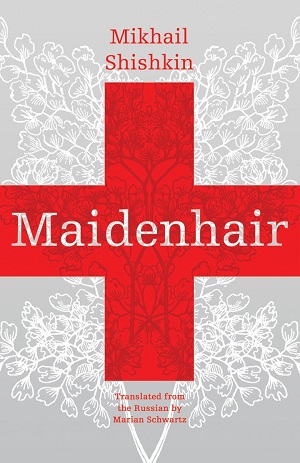
by by Margaret Kolb

Published by Open Letter, 2012 | 506 pages
Mikhail Shiskin, the only writer to have won Russia’s three most prestigious book awards, lives in Switzerland. In interviews, he says this distance from Russia enables him to see his homeland more clearly. Gogol, he notes, felt similarly. As, of course, did James Joyce. It was in Switzerland that Shiskin came to work as a translator for Russian asylum-seekers, or gesuchsteller. Outside of the country, the gesuchsteller felt safe recounting their stories—stories Shishkin repeated as if they were his own. A book began to form.
Maidenhair divides into three distinct strands. The first is a series of interview transcripts from a refugee center in Switzerland. The second revolves around the refugee center’s Interpreter; this portion takes the form of long letters in which the Interpreter speaks of himself in the third person. At one point, he recounts finding the diaries of Isabella, a forgotten Russian singer coming of age during World War I and the Russian Revolution. The third strand is comprised of these diaries. The text proceeds forward in abrupt shifts between the three.
The first strand shows the interviews of the gesuchsteller, conducted by the Master of Fates (the Interpreter’s boss). To increase their chances of passing this final stage in the process of requesting asylum, the gesuchsteller augment the horrific aspects of their stories; the stories become full of absurd and fantastic elements that seep into the rest of the novel. The Master of Fates tries to catch these lies, giving him grounds to deny their admittance. As it becomes clear that no one will be granted asylum, the gesuchsteller—as well as the Master of Fates—shift their focus from the truth of the eye to the truth of the heart, weaving fantastical exaggerations that are, in fact, more accurate representations of the gesuchsteller’s experiences than the straight facts. Instead of picking apart these stories, the Master of Fates adds to them, and together they co-narrate wild, disturbing tales in which God is portrayed as an abusive army commander, and a trail of blood runs from a murder scene to a municipal building (the police report it as a suicide).
In Maidenhair’s second strand, the Interpreter, his own narration mingling with the fantastic tales of the gesuchsteller, writes to Nebuchadnezzasaurus, the vampire-ruler of a vast, distant land. He describes his vacation in Italy with Isolde, who has never gotten over Tristan. In the novel’s third strand, Isabella’s diaries show her struggle to live a life guided by love as war flows in and out of Russia as easily as the tides. Towards the novel’s conclusion, the distinctions between the strands and characters blur and break down.
Maidenhair’s form allows Shiskin to paint an expansive, layered portrait of his homeland. As the interviews depict a bleak picture of life in modern Russia, Isabella’s diaries position these stories within a larger context of war and violence. The character of Isabella adds other hues to the work as well, as she, even amidst the violence of war, passionately dedicates her life to love.
Love, for Maidenhair’s characters, provides a separate peace from the dark and violent world. One gesuchsteller describes love as a God-sized centipede with as many legs as humanity, occupying an invisible and intangible dimension, imperceptibly entwined with space and time. Almost all the characters have loved, then found their partners torn away—either by some fault of character or manifestation of state violence. Love, however, is also portrayed as the thread that binds these characters, bringing the stories of Maidenhair together into a cohesive, albeit knotted, whole. Shiskin delicately arranges/juxtaposes the cacophony of truths that coexist in this world.
Shishkin oscillates the reader’s distance to the text. The writing is rich, the fantastic storyworlds beckon, and all is presented in the rhetoric of “found” forms: transcripts, letters, diaries. But he has a Brechtian tendency to tear down the fourth wall, and the characters regularly discuss the powers and limitations of language. Samuel Morse makes a cameo in the novel, trying to invent a new language to better describe our world. He reveals his language is intended not for war but for—what else—love.
From his base in Switzerland, Shiskin is a vocal critic of his native Russia. He has published essays on his relationship to his homeland in the Wall Street Journal, and he turned down a lucrative opportunity to serve on the Russian delegation at BookExpo America, writing,
A country where power has been seized by a corrupt, criminal regime, where the state is a pyramid of thieves, where elections have become farce, where courts serve the authorities, not the law, where there are political prisoners, where state television has become a prostitute, where packs of impostors pass insane laws that are returning everyone to the Middle Ages—such a country cannot be my Russia.And yet Maidenhair is about far more than contemporary politics. Part of its beauty resides in how emotional truth becomes entwined with, and indistinct from, forensic truth. Shiskin continues, in the tradition of Gogol, writing strange love letters to a vast, distant land.
Jack Schiff taught high school English in Houston after graduating from the University of Maryland in 2011. He now works for Narrative Magazine in San Francisco.















click to see who
MAKE Magazine Publisher MAKE Literary Productions Managing Editor Chamandeep Bains Assistant Managing Editor and Web Editor Kenneth Guay Fiction Editor Kamilah Foreman Nonfiction Editor Jessica Anne Poetry Editor Joel Craig Intercambio Poetry Editor Daniel Borzutzky Intercambio Prose Editor Brenda Lozano Latin American Art Portfolio Editor Alejandro Almanza Pereda Reviews Editor Mark Molloy Portfolio Art Editor Sarah Kramer Creative Director Joshua Hauth, Hauthwares Webmaster Johnathan Crawford Proofreader/Copy Editor Sarah Kramer Associate Fiction Editors LC Fiore, Jim Kourlas, Kerstin Schaars Contributing Editors Kyle Beachy, Steffi Drewes, Katie Geha, Kathleen Rooney Social Media Coordinator Jennifer De Poorter
MAKE Literary Productions, NFP Co-directors, Sarah Dodson and Joel Craig